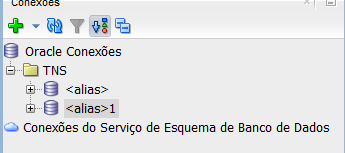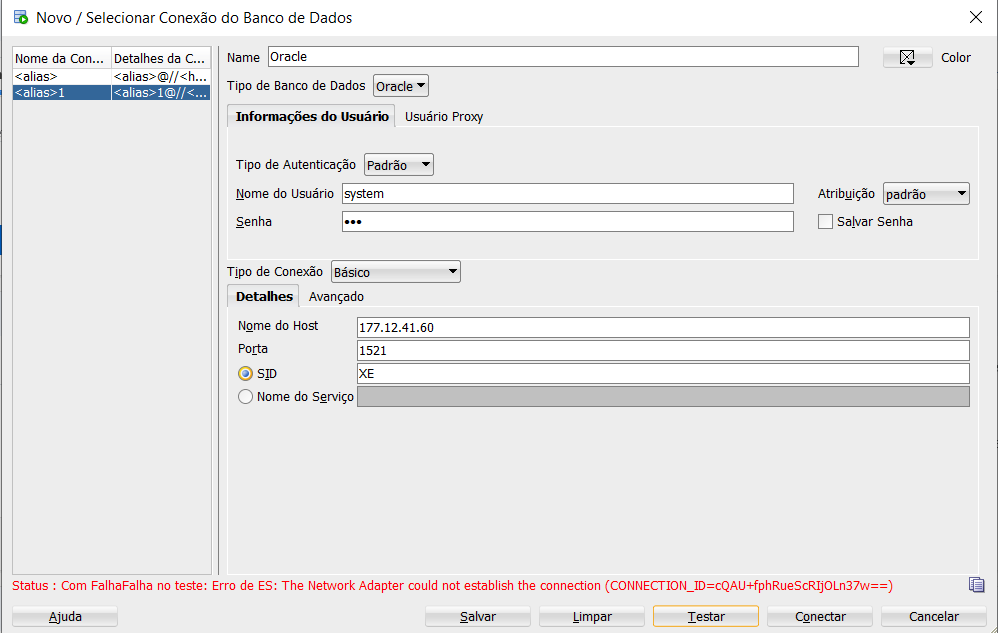listener.ora já tentei apagar o que vem de padrão, que é a parte inicial e deixar só a parte que está no final, que colocaram como solução no forum, mas continua o erro ( só muda o código final do CONNECTION_ID). Usei HOST como localhost, quanto o meu ip, ambos com o mesmo erro.
# copyright (c) 1997 by the Oracle Corporation
#
# NAME
# listener.ora
# FUNCTION
# Network Listener startup parameter file example
# NOTES
# This file contains all the parameters for listener.ora,
# and could be used to configure the listener by uncommenting
# and changing values. Multiple listeners can be configured
# in one listener.ora, so listener.ora parameters take the form
# of SID_LIST_<lsnr>, where <lsnr> is the name of the listener
# this parameter refers to. All parameters and values are
# case-insensitive.
# <lsnr>
# This parameter specifies both the name of the listener, and
# it listening address(es). Other parameters for this listener
# us this name in place of <lsnr>. When not specified,
# the name for <lsnr> defaults to "LISTENER", with the default
# address value as shown below.
#
# LISTENER =
# (ADDRESS_LIST=
# (ADDRESS=(PROTOCOL=tcp)(HOST=localhost)(PORT=1521))
# (ADDRESS=(PROTOCOL=ipc)(KEY=PNPKEY)))
# SID_LIST_<lsnr>
# List of services the listener knows about and can connect
# clients to. There is no default. See the Net8 Administrator's
# Guide for more information.
#
# SID_LIST_LISTENER=
# (SID_LIST=
# (SID_DESC=
# #BEQUEATH CONFIG
# (GLOBAL_DBNAME=salesdb.mycompany)
# (SID_NAME=sid1)
# (ORACLE_HOME=/private/app/oracle/product/8.0.3)
# #PRESPAWN CONFIG
# (PRESPAWN_MAX=20)
# (PRESPAWN_LIST=
# (PRESPAWN_DESC=(PROTOCOL=tcp)(POOL_SIZE=2)(TIMEOUT=1))
# )
# )
# )
# PASSWORDS_<lsnr>
# Specifies a password to authenticate stopping the listener.
# Both encrypted and plain-text values can be set. Encrypted passwords
# can be set and stored using lsnrctl.
# LSNRCTL> change_password
# Will prompt for old and new passwords, and use encryption both
# to match the old password and to set the new one.
# LSNRCTL> set password
# Will prompt for the new password, for authentication with
# the listener. The password must be set before running the next
# command.
# LSNRCTL> save_config
# Will save the changed password to listener.ora. These last two
# steps are not necessary if SAVE_CONFIG_ON_STOP_<lsnr> is ON.
# See below.
#
# Default: NONE
#
# PASSWORDS_LISTENER = 20A22647832FB454 # "foobar"
# SAVE_CONFIG_ON_STOP_<lsnr>
# Tells the listener to save configuration changes to listener.ora when
# it shuts down. Changed parameter values will be written to the file,
# while preserving formatting and comments.
# Default: OFF
# Values: ON/OFF
#
# SAVE_CONFIG_ON_STOP_LISTENER = ON
# USE_PLUG_AND_PLAY_<lsnr>
# Tells the listener to contact an Onames server and register itself
# and its services with Onames.
# Values: ON/OFF
# Default: OFF
#
# USE_PLUG_AND_PLAY_LISTENER = ON
# LOG_FILE_<lsnr>
# Sets the name of the listener's log file. The .log extension
# is added automatically.
# Default=<lsnr>
#
# LOG_FILE_LISTENER = lsnr
# LOG_DIRECTORY_<lsnr>
# Sets the directory for the listener's log file.
# Default: <oracle_home>/network/log
#
# LOG_DIRECTORY_LISTENER = /private/app/oracle/product/8.0.3/network/log
# TRACE_LEVEL_<lsnr>
# Specifies desired tracing level.
# Default: OFF
# Values: OFF/USER/ADMIN/SUPPORT/0-16
#
# TRACE_LEVEL_LISTENER = SUPPORT
# TRACE_FILE_<lsnr>
# Sets the name of the listener's trace file. The .trc extension
# is added automatically.
# Default: <lsnr>
#
# TRACE_FILE_LISTENER = lsnr
# TRACE_DIRECTORY_<lsnr>
# Sets the directory for the listener's trace file.
# Default: <oracle_home>/network/trace
#
# TRACE_DIRECTORY_LISTENER=/private/app/oracle/product/8.0.3/network/trace
# CONNECT_TIMEOUT_<lsnr>
# Sets the number of seconds that the listener waits to get a
# valid database query after it has been started.
# Default: 10
#
# CONNECT_TIMEOUT_LISTENER=10
DEFAULT_SERVICE_LISTENER = XE
SID_LIST_LISTENER =
(SID_LIST =
(SID_DESC =
(SID_NAME = CLRxtProc)
(ORACLE_HOME = C:\app\lucas\product\21c\dbhomeXE)
(PROGRAM = extproc)
(ENVS = "EXTPROC_DLLS=ONLY:C:\app\lucas\product\21c\dbhomeXE\bin\oraclr.dll")
)
)
LISTENER =
(DESCRIPTION_LIST=
(DESCRIPTION =
(ADDRESS = (PROTOCOL=TCP)(HOST=177.12.41.60)(PORT = 1521))
(ADDRESS=(PROTOCOL = IPC)(KEY = EXTPROC1521))
)
)







